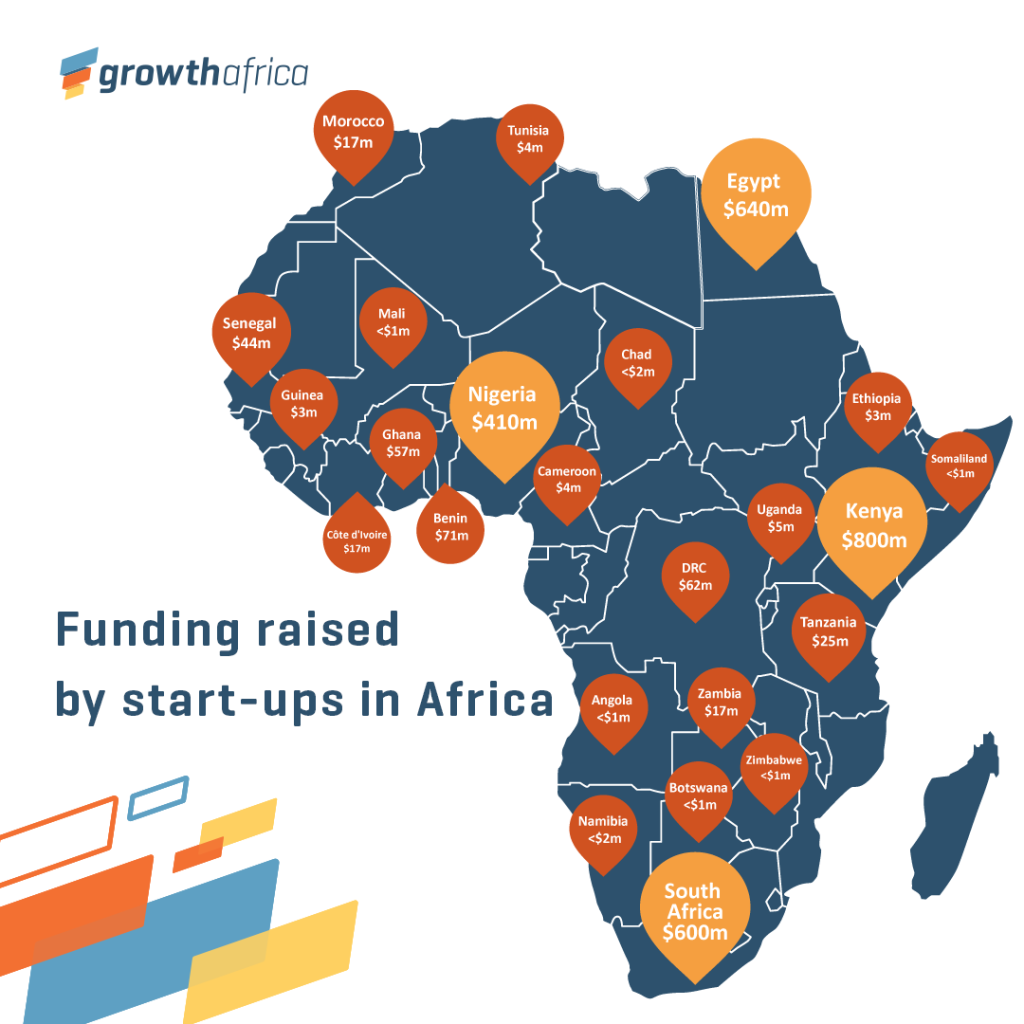Beyond the Big Four: Opportunities in Africa’s Emerging Startup Ecosystems

Karen Maina
June 4, 2025

The “Big Four”: Nigeria, Kenya, South Africa, and Egypt. These countries dominate the conversation in Africa when discussing technology, innovation, and startups. They have a history of attracting the lion’s share of startup funding, media coverage, and international investor attention. However, a growing wave of successful startups is rising beyond these four traditional giants.
Countries like Zambia, Uganda, Rwanda, and Ghana are quietly and steadily building strong ecosystems with local innovation, digital infrastructure, and domestic and diaspora capital growth. These markets should not be overlooked as they offer an opportunity for impact and profit for founders who want to solve real-world problems.
Data That Shows Growth in Emerging Markets
According to Partech Africa’s Funding Report, there was a 28% increase in early-stage funding within the emerging markets. While the Big Four still dominate, there is a slight, visible slowing down.
Ghana, for example, has consistently ranked in the top five for startup deal volume over the past two years, while Rwanda, which is primarily known for governance excellence, is now making waves in AI, fintech, and drone logistics. Zambia is a country we are now consistently discussing on the Tech Tides Africa Podcast. It is smaller in population, but it is attracting climate tech and agri-innovation startups at an impressive rate.
Uganda’s Innovation Village alone has supported over 500 startups and is collaborating with corporate partners to close the skills and funding gaps. In these countries, the startup ecosystem is becoming more deliberate, focused, and ripe for strategic early investments.
Sectors That Are Experiencing Startup Growth
Unlike the fintech frenzy in Nigeria and Kenya, emerging ecosystems demonstrate sectoral diversity, often closely tied to pressing local needs. These are businesses born out of necessity. In countries like Kenya and Nigeria, there is a fintech frenzy. However, in these emerging markets, the innovations are focused on pressing local needs like agriculture and healthcare.
1. Agritech
Agriculture is a key industry in Africa. From climate-resilient crop platforms in Zambia to digital supply chains in Uganda, agritech is key in these markets. AgroCenta in Ghana is helping smallholder farmers access markets and fair pricing, while Rwanda’s AgriGo is building innovative irrigation solutions to combat drought.
2. Climate Tech
The Green Fund in Rwanda and Zambia’s off-grid energy startups are solving climate change. In Uganda, BBOXX and Zembo are Ugandan businesses in green energy.
3. Logistics and Trade
Trade within Africa is growing, which requires smarter transport and logistics. Companies like Kasha in Rwanda and Jetstream in Ghana are improving delivery systems and data-driven freight forwarding.
4. Healthcare Solutions
A significant challenge in most, if not all, African countries is access to healthcare. The ratio of doctors to patients is wrong, as is access to medication and equipment. Startups like mPharma are building Pan-African solutions by partnering with pharmacies and clinics across these emerging markets.
Who’s Funding This Future?
Funding in these new markets is still limited compared to the Big Four. However, this is starting to change.
1. Local VCs with Skin in the Game
Funds like Chandaria Capital (Kenya/Uganda) and Frontier Digital Ventures are betting early on hyperlocal solutions. Local investors bring more than money—they offer cultural insight, networks, and long-term patience.
2. Diaspora-Backed Capital
African diaspora communities are now establishing angel syndicates and funds to invest back home. Platforms like Diaspora Angel Network and Sankore VC fund seed-stage ventures in Ghana, Rwanda, and beyond, often combining capital with mentorship and advisory services.
3. Impact and Blended Finance
Social impact remains a core theme. Funds like Acumen, Novastar, and AFD’s Digital Africa initiative target startups with a double bottom line, profit and purpose. These funds are not afraid of markets outside the limelight.
The Challenges for These Ecosystems
The opportunities within these markets are clear. However, many systemic challenges are yet to be resolved.
- Limited local capital: Many founders still rely on grants or friends-and-family funding.
- Regulatory uncertainty: Policies are outdated or inconsistently enforced, making compliance costly and risky.
- Infrastructure gaps: Inconsistent internet access, poor roads, and unreliable electricity can stall operations.
- Talent migration: As startups grow, retaining skilled developers and operational staff becomes difficult amid global competition.
Founders often wear two hats: visionary and survivalist; they must balance product-market fit with ensuring business continuity.
Case Studies: Success from the Margins
Jetstream Africa (Ghana)
Jetstream is changing African trade logistics with a platform coordinating end-to-end cargo movement. It raised $13 million in equity and debt in 2023 and already serves over 40 SMEs with streamlined customs, financing, and freight tools.
Kasha (Rwanda)
Kasha started as an e-commerce platform for health products and has grown into a regional logistics and last-mile delivery player. It focuses on women’s health and hygiene products and has expanded operations into Kenya and Uganda.
Zembo (Uganda)
A green mobility startup offering electric motorcycles and battery-swapping stations, Zembo is gaining traction among boda boda drivers in Kampala—the startup leverages clean tech and fintech for transport and livelihoods.
How Can Founders and Investors Take Advantage of This Trend?
Investors
If you are an investor, this is a great time to enter these markets while considering the following:
- Invest early and focus on local issues. Seed-stage investments with smaller cheque sizes and high support can yield disproportionate impact and future returns.
- Partner with startup hubs. Innovation hubs and accelerators in Kigali, Accra, and Lusaka are crucial gatekeepers to pipeline and due diligence.
- Let go of the Big Four lens. These markets differ; consumer behaviour, regulatory environments, and digital infrastructure vary.
Founders
- Your business model should be built for resilience. It must survive both tech and non-tech disruptions. Offline functionality, mobile-first design, and agent networks are key.
- Collaborate with NGOs, governments, and research institutions, especially in sectors like climate and health.
- Tap into the diaspora for funding. Global African talent and capital are investing in the continent.
Conclusion
Africa’s growth is no longer confined to Lagos, Nairobi, Cairo, or Cape Town. Cities like Accra to Kigali, Kampala to Lusaka, are writing new investment stories. They are leaner, grittier, and often more grounded in local realities.
Read next: Switch Electric: Merging Solar Energy and Innovation with Christwin Jr.


